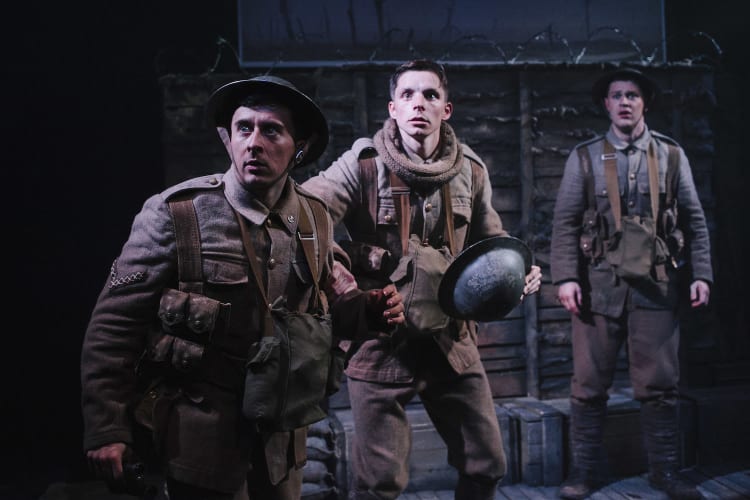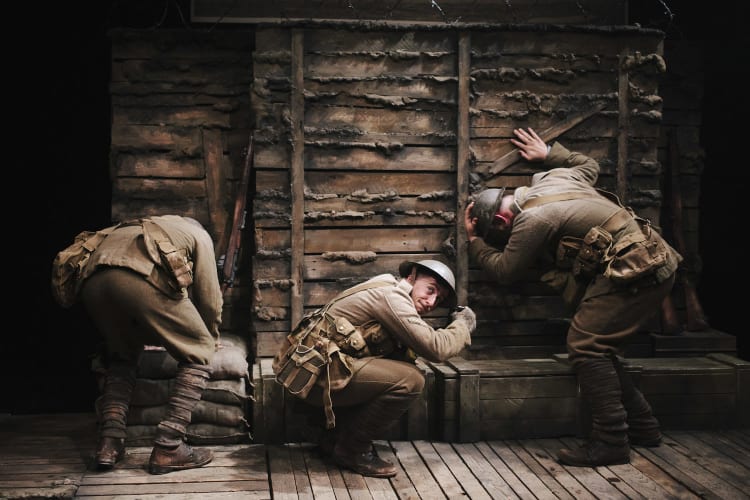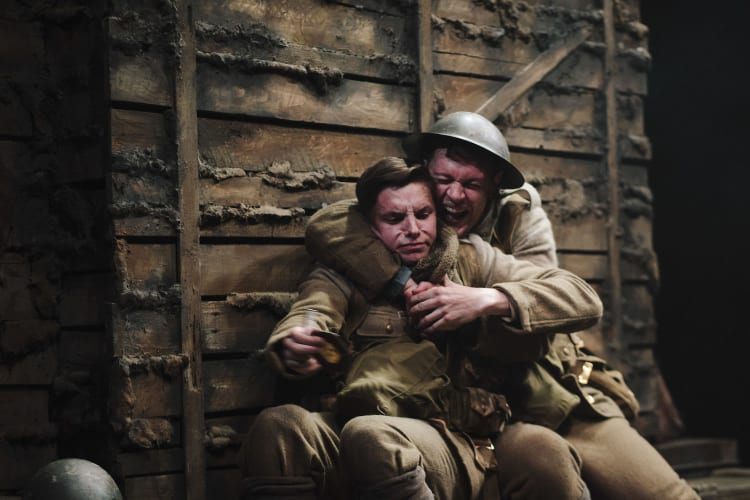Theatre Centre has created its contribution to the commemoration of the First World War for audiences of 13+ and will be touring it to schools and theatres until the end of November and then in 2015.
It is not easy, when so many companies are mounting productions to mark this centenary, to come up with something that is fresh and original, but Jesse Briton has not written about the obvious aspects of the war. The carnage, courage, new ways of battle and the mistakes of the General Staff are all there in the background but this is a play about loyalties: loyalty to one’s country, to one’s fellows and especially loyalty to one’s mates.
Just over an hour in length, this production by director Natalie Wilson is simply staged with some stunning sound and lighting effects.
Designer Emma Donavan’s set presents the duckboards and timbered wall of a British trench in Flanders, in 1917, during the Battle of Ypres. It is an observation post manned by Will, Robbie and Jumbo, three lads from Sunderland. They were choristers together in a church choir; when they were called up, they all joined the Durham Light Infantry and are still together now.
These young men are not trying to be heroes. These are conscripted lads, not in a hurry to get out there and kill Bosche. Rather the opposite: between them they’ve made a three-part pact to the mantra “Nae killing, only singing and we all go home together.”
There is plenty in the context to spark off classroom investigations for pupils not already well informed about the Great War, but it is the moral issues this play raises that are at its heart.
Food is in short supply, a candle is lit to search for lice and there is talk of rats, but this production doesn’t wallow in the mud, the Front’s physical discomforts and hardships of the Front, although there are frequent bursts of bombardment.
When these Geordies seek some relief from their tensions by singing, it helps the enemy to locate their position and to focus on it as a target. They don’t themselves get hit, but a soldier just down the line is killed. This leads to them being threatened with court martial and possibly facing a firing squad, but there is an assault being prepared and that could save them.
They are offered a deal to stay where they are and, when given a signal, they sing as loud as they can to attract enemy fire and distract them from where the assault will be made. It will put them in danger, but make them heroes instead of miscreants. Or, at least, that is what Lance Corporal Will comes back from command post to tell them.
But can they trust him? Robbie finds out that Will volunteered to be part of a firing squad—that’s what got his promotion. So much for not killing: and one of us, not the enemy, another lad who didn’t want to be there, who just wanted to go home.
Will says he did it for them, to get them all privileges and away from the Front, but what is the truth and what are the rights and the wrongs here?
Lawrence Russell makes small, bossy Will lively and likable. You want to believe he means all for the best, but there is room for a niggling doubt. Ryan Penny’s Robbie puts a brave face on things, sarcasm hides his fears, while the least secure, Jumbo, relies on the support of the others to keep going. Andrew Burrell shows him crumbling; even singing now gives him the shakes.
These are three distinct performances by three actors in an ensemble as dependent on each other as the characters they are playing. They give a very convincing picture of friendship, as well as a compromised honesty, not least in the writing of a letter of condolence to a dead comrade’s mother after a gas attack.
There are many things here that will ring true to anyone over whose families the Great War cast its long shadow (I still have one of those lying letters) or who were themselves conscripted into military service in later conflicts. Today, the state makes more allowance for conscience, but the questions of personal morality still have to be faced by each generation.
Contributing greatly to the atmosphere of Natalie Wilsons’s carefully shaped production are Charlie Lucas’s lighting and the sound design of Elena Peña with its big artillery, automatic fire and sniper shots mixed with the popular songs of the time, which give way to bombardment and soldier choruses the squaddies themselves sang, reflecting that conflict between death and a defying spirit of survival, however superficial.


